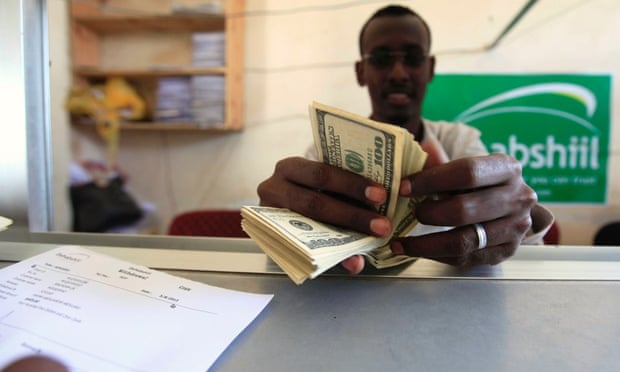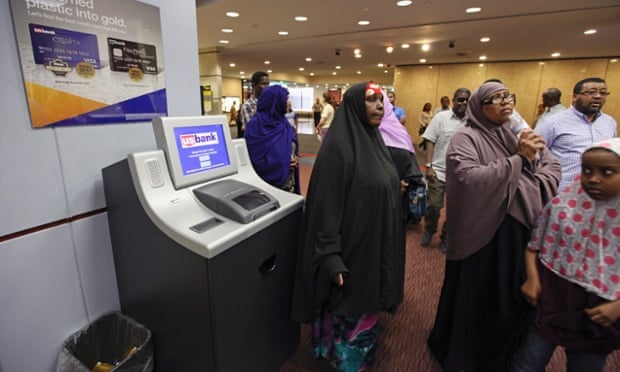Ending Somali-US money transfers will be devastating, Merchants Bank warned
Merchants Bank of California expected to close ‘the last safe and legal pipeline to provide humanitarian remittances’, says US congressman Keith Ellison
Proposals by the last US bank specialising in money transfers to close the accounts of companies transferring cash between the US and Somalia will have a devastating affect on the millions of Somalis who rely on remittances to survive.
On Friday, Merchants Bank of California is expected to close the accounts of all Somali-American money transfer companies on its books.
The bank sent out letters to customers at the end of January informing them of the decision. The bank has not responded to the Guardian’s requests for comment. If it goes ahead with its decision, it would be the second time the bank has warned Somali remittance companies of pending account closures; in October 2014, the bank reversed a prior decision to close their accounts.
Remittance payments to Somalia dwarf aid spending. Overseas development assistance to Somalia is $75 (£50) per capita, including both humanitarian and development aid, compared with an estimated $110 per capita in remittances entering the country, which amounts to 35% of GDP, the highest level in the world. Somalis in the US alone send more than $200m, according to Oxfam; the UK sends more than $162m, followed by Germany and the Netherlands.
But regulatory pressure is throttling the life-saving inflows. Money transfer operators, which work like Western Union, but reach remote locations at a fraction of the cost, have come under scrutiny in the past few years for potentially laundering money or funding terrorism. In response, banks have been closing their accounts.
In the US, the Sunrise Community Banks based in Minnesota closed all Somali-American remittance accounts in 2011, following two high-profile prosecutions of Somali-Americans in the city. A handful of banks are understood to still be operating, keeping a low profile.
Keith Ellison, congressman and representative for Minneapolis, where North America’s largest Somali population lives, said the decision to close these accounts is catastrophic. “For the past few years, I have been warning every regulator and official about the devastating effects of closing the last safe and legal pipeline to provide humanitarian remittances to Somalia,” he said in a statement released by Oxfam. “There is no doubt that a decline in remittances will exacerbate the humanitarian crisis and erode the gains Somalia has made in recent years.”
According to UN’s food security and nutrition analysis unit, more than 730,000 Somalis are food insecure, and an additional 2.3 million are struggling to meet basic food needs.
The remittance services sector has been choked in the UK, as well. In May 2013, Barclays, the last major bank to provide remittance services to Somalia, announced plans to close the accounts of about 250 money transfer businesses, citing concerns about money laundering. In November that year, Dahabshiil won a temporary injunction against the bank at the high court to keep its account, and the lifeline for its customers, open.
“Every time a bank closes, the media asks, ‘What’s the impact?’ You tell them it’s serious, but the remittances don’t stop flowing, so they don’t see the immediate impact – they think we’re exaggerating. But it’s just a slow death,” said Degan Ali, the executive director of the NGO Adeso. “It’s a complicated chain and the links keep breaking and becoming weaker.”
As a bank that specialises in remittances, and one of a few that still does business with Somali remittance companies, Merchants Bank of California is considered one of the key links in the chain.
“The potential impact of the closure of the remittance industry in Somalia would be devastating,” Ali said. “The last famine is estimated to have killed 265,000 people. Triple that number would not be able to access basic needs if the remittance flows stop.”
In an advisory note published on 30 January, Oxfam and Adeso called on the US government to put in place emergency measures to mitigate the negative fallout of the closures. “For example, the Treasury Department can announce a special, temporary regulatory regime for banks dealing with Somali money transfer organisations, or it can designate a public financial institution, such as a Federal Reserve Bank, to transfer funds abroad on behalf of [them],” it said. “Urgent action must be taken to avoid millions of Somalis losing their lifeline of remittances.”
Little aid reaches the disputed Sanaag region on the border of Puntland and Somaliland, as it is deemed too unsafe for international organisations to operate there.
Along with the grasslands and herds of livestock, livelihoods have all but dried up.
Every month, Khadija Hassan, a 52-year old mother of four living in Badhan, walks to the Dahabshiil broker in town to collect $300 from her daughter, who works in a supermarket in Minneapolis. With that, Hassan supports a family of 12. “There is no government, there are no banks – it is all we have,” she says.
Women like Hassan are deeply concerned by rumours, which have been circulating for a few years now, that Dahabshiil will one day close. “If they took Dahabshiil away, we’d have nothing,” she says.
In July, heads of state and government ministers will meet in Addis Ababa to discuss how to pay for the sustainable development goals, which will replace the millennium development goals when they expire at the end of the year.
One of the debates at the third international conference on financing for development will be how remittances can be formalised to support development, such as through increased transparency and competition, making use of new technologies, launching a global non-profit platform and setting a target to lower the cost of sending money.






